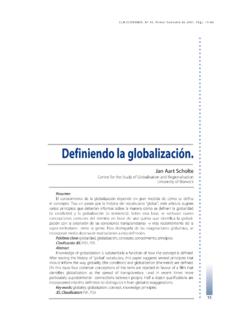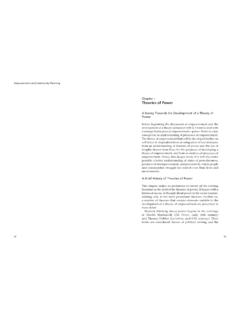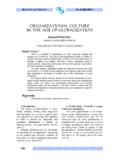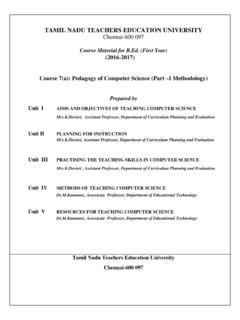Transcription of Globalization: Definition, Processes and Concepts
1 Revista Rom n de Statistic Supliment Trim IV/2012 137 globalization : Definition, Processes and Concepts Sandu CUTERELA - PhD student National Defense University Carol I Abstract The paper initiates from two assumptions: the first one is that globalization is an inevitable phenomenon, characterizing our development era, a phenomenon that the human society is forced to understand, because for the first time, it questions the surviving and evolution of the human society. The second is that globalization , as a socio-historical phenomenon, manifested itself firstly as a theory, then as a practical necessity, becoming a strategy for the constitution of a sole market, spread across a huge surface, the engulfs states, regions, continents. This paper presents the economical, political, cultural, social and risk changes, that influences the rise and stabilization of the phenomenon of globalization .
2 This complex process is linked to the economical power of the big, industrialized states ad, unfortunately, of the great transnational companies. The process itself brings together countries with different development views, with different religions and cultures, and, most important, ex colonialist countries and their old colonies. The conclusion of the paper discusses ways of understanding, controlling and diminishing of the negative effects and collateral losses manifested since the initialization of the phenomenon and its settling in a certain region. Key words: Culture, Economic, Global, globalization ,International, Multinational, National, Market , Regional JEL Classification: F60 Definitions The term globalization comes from English, as base of the word globalization which refers to the emerging of an international network, belonging to an economical and social system1.
3 One of the earliest uses of the term " globalization ", as known, was in 1930 - in a publication entitled Towards New Education - to designate an overview of the human experience in education2. A near-term "giant corporations" was used in 18973 by Charles Russell Tazel to describe the big national trusts and other large enterprises of the time. Since 1960 both terms began to be used interchangeably by economists and researchers in social sciences and were used until about mid 1980. Since the invention of the concept, globalization has inspired numerous interpretations definitions and has had a history going back in time to the great commercial 1 globalization . Online etimologi dictionary.
4 2 " globalization ". Oxford English Dictionary Online. September 2009. 3 "''The Battle of Armageddon'', October, 1897 pages 365 370". Retrieved 31 July 2010. Revista Rom n de Statistic Supliment Trim IV/2012 138and imperialist movements throughout Asia and the Indian Ocean since the fifteenth century4. Vladislav Inosemtsev defines globalization as one of the most popular social studies of today, but is at the same time an empty term. It was first mentioned in literature in the mid 1940s, but up until the mid 1980s it was mentioned only occasionally. After the Cold War the term began to be used to describe the world becoming more interdependent in its economical and informational dimension5.
5 Because of the complexity of the concept, research projects, articles and debates have remained mostly focused on one aspect of globalization6. Roland Robertson, a professor of sociology at the University of Aberden, was the first person who defined globalization as "the understanding of the world and the increased perception of the world as a whole."7. Martin Albrow and Elizabeth King, sociologists, define globalization as "all those Processes by which the peoples of the world are incorporated into a single world society8. In his paper "The Consequences of Modernity", Anthony Giddens uses the following definition: "the globalization can be defined as the intensification of social relations throughout the world, linking distant localities in such a way that local happenings are formed as a result of events that occur many miles away and vice versa9.
6 In his paper Global Transformations David Held studies the definition of globalization and says, "although in a simplistic sense globalization refers to a rapid global interconnection, deep and on large scale, such definition but requires now a more complex research". globalization can be linked to the local, the national and the regional. On the one hand, a connection is made between social and economic relationships and networks, organized on a local and / or national, on the other hand, it connects social and economic relationships and networks crystallized on wider scale the regional and global interactions. globalization can refer to those spatial-temporal Processes of change, which constitutes the fundament of the transformation of human concerns in an organization, linking together and expanding human activity across regions and continents.
7 Without referring to the expansion in space of the connections, there can be no clear and coherent formulation of the term globalization . A satisfactory definition of globalization must address each of these items: extension, intensity, celerity and The Swedish journalist Thomas Larsson, in his book The Race to the Top: The Real Story of globalization , says that globalization "is the process of the shrinking of the world, the shortening of distances, and the closeness of things. It allows the increased 4 Hopkins, (ed.). (2004). globalization in World History. London: Norton, pp. 4 8. ISBN 978-0393979428 5 Inosemtsev Vladislav L. Age of Num. Present Day globalization 6 Al-Rodhan, Nayef and G rard Stoudmann.
8 (2006, 19 June). "Definitions of globalization : A Comprehensive Overview and a Proposed Definition." 7 Robertson, Roland (1992). globalization : social theory and global culture (Reprint. ed.). London: Sage. ISBN 0803981872 8 Albrow, Martin and Elizabeth King (eds.) (1990). globalization , Knowledge and Society London: Sage. ISBN 978-0803983243 p. 8. "..all those Processes by which the peoples of the world are incorporated into a single world society." 9 Giddens, Anthony. (1991). The Consequences of Modernity Cambridge: Polity Press. p. 64. ISBN 9780745609232 10 Held, David, et al. (1999). Global Transformations Cambridge: Polity Press. ISBN 9780745614984 Revista Rom n de Statistic Supliment Trim IV/2012 139interaction of any person on one part of the world to someone found on the other side of the world, in order to benefit"11.
9 In 2000 the International Monetary Fund has identified four basic aspects of globalization : trade and transactions, capital movements and investment, migration and movement of people and the spreading of Pro and cons analysis of Processes and Concepts The reactions to the Processes that contribute to the globalization Processes have seen a wide variety, with a history as long as it is extraterritorial in terms of contact, interaction and commerce. The philosophical differences regarding the costs and benefits of such Processes have given rise to ideological and social movements. Proponents of economic growth, expansion and development in general, see the globalization Processes as desirable and necessary for the good of human society.
10 Critics see one or more Processes of globalization as detrimental to social welfare on a global or local This includes all those who question the social and natural sustainability on long term, the continuous economic expansion, the social structural inequality caused by these Processes , and the colonial, imperialist or hegemonic ethnocentrism, the cultural assimilation and the cultural appropriation, emerging, influencing and linking such Processes . Key aspects of globalization globalization is the favorite trap-concept of journalists and politicians. The term has also become the key idea for the practice and theory of the business, but also came in academic debates. Unfortunately, what people want to express or define by globalization is often confusing.








